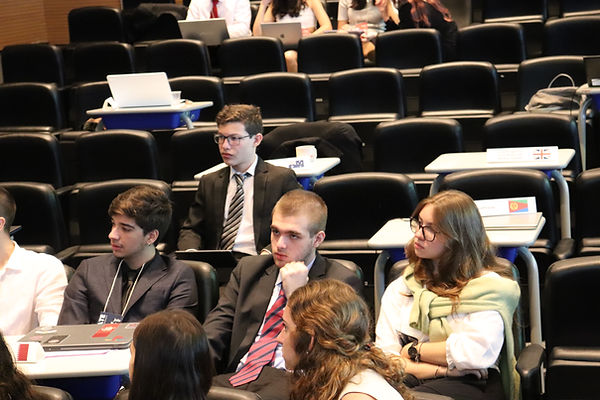POSMUN
The newspaper
Tuesday, 19th of April 2022
The second day of the debate
UNEP - Green legislation: International effects of Amazonian deforestation.
On the 4th session of the debate the delegates started a semi-moderated caucus (15 minutes) in order to finish their first working paper about the first topic of the council´s agenda, that being: Affirming the importance of discussing methods to combat agricultural deforestation. The working paper presented some interesting ideas such as:
-
Providing a subsidy to familiar farms in order to make up for the production of familiar farms; Sustainably managing unsalvageable territory aiming to recover it; Adopting afforestation; Agroforestry actions.
The council then started a semi-moderated congress in order to focus on the second topic of the agenda that is: Encouraging the discussion of methods to combat natural deforestation through wildfires. The delegates presented some engaging suggestions such as:
-
Kingdom of Denmark´s proposal of investing in Institutions that control the global warming.
-
People´s Republic of China´s idea of installing a pollution control system.
-
Federative Republic of Brazil´s suggestion on an investment towards fire fighters.
In order to terminate the discussion of the second working paper, the delegates came to a decision of embracing some subtopics in the following working paper, including:
-
Access possibilities for remote areas of the forest; Effective monitoring of high-risk fire areas; Setting land limits for landowners that hold more than 50 hectares in the Amazon region in case of recent wildfires in the region.
In the end of the 4th council session and start of the 5th session the delegates discussed the third topic of the agenda (Considers the importance of discussing the economic and the environmental aspects of the Amazonian deforestation and search for balance among them; Discuss the topic of economy versus environment topic of politics versus environment) starting with a speakers list in the end of the 4th session and a semi-moderated congress in the first 11 minutes of the 5th session. The third working paper holds some valuable alludes, some of which will be quoted below:
-
Development of stronger anti-corruption measures among the responsible authorities for the permits given by each respective government; Responsible improvement of the local communities; Enhancing the transparency of the actions involved in the economic activities; Development of the value chain being made accordingly to international climate agreements, such as the Paris Climate Agreement.
Apart from what has been decided, Russian Federation has presented a very captivating solution to the topic presented above, that consists on working with the transparency of the country´s corruption, so that other countries wish to invest in Amazonia and so that the country becomes more sustainable.
The next twenty-five minutes of the conference were reserved to discuss the fourth topic on the agenda(Recommends negotiations of international coalitions to control deforestation in the future and set goals for reforestation by debating green investments for the Amazon region) utilizing an unmoderated congress, in order to build a working paper. The debate form then changed for a semi-moderated congress for fifty five minutes in order to debate the topics and subtopics of the 4th working paper, coming up with the many results, among these results are:
-
Encourages endorsing the strengthening of National Determined Contributions (NDC) in the signatory countries in this committee to reduce carbon emission in the long-run by amplifying the efficiency of such commitment in the countries that accept it, with the spendings being focused towards:
-
prioritizing nature-based solutions for climate change;
-
maintaining “current” legislation in order to avoid the legalization of the deforestation levels;
-
-
Organization should be funded by sources such as, but not limited to: Private donations; Governmental donations; The Green Climate Fund; The World Bank;
The 6th session of the council began with a speakers list who would formally impose their ideas in relation to the fifth topic of the UNEP agenda(Suggests the necessity of debating solutions to illegal deforestation)
The Bolivarian Republic of Venezuela proposed a very valid idea that would be forbidding the burning of sugar canes in countries that lay in the Amazonian region.
Meanwhile the United Kingdom of Great Britain and Northern Ireland presented an interesting point of view that consists in the fact that most of the solutions that were suggested for that topic would only work if we lived in an utopic world which is not the case.
CRISIS! CRISIS! Venezuelan small farmers “Penã” started big wildfires in Brazil.
The Wall Street Journal states that Venezuela refuse to take accountability and stop the fires, stating that Brazil´s rainforest territory should be under Venezuela’s possession. People´s Republic of China has already provided hydroplanes to help Brazil. Despite having Venezuela’s support regarding previous economic issues.
During a 50-minute Semi-moderated congress the delegates discuss a solution to the problem, where Venezuela affirms not to hold grudge against China, since China also has partnerships with Brazil, for example: China is on the top 5 importers of Brazil. Latin Countries(except for Venezuela) that are close to the damaged area will support Brazil by sending hydroplanes; helicopters; fire fighters; military help and shelters. China proposes to isolate the damage area affirming that there´s no coming back from that damage. The United States of America offers help with military..., but won´t help in any other way. The United Kingdom affirms that Venezuela should pay for the damage and won´t help Brazil save the area in decay. Venezuela decides not to fiscally help Brazil, but indicate a technic to isolate the area. The delegates work on a working paper to solve the problem. The working paper contains the following ideas:
1. Recommends urgent material donations from willing nations, such donations include distinct categories, regarding:
a) Neighboring nations donations and assists: Hydroplanes; Helicopters; Fire fighters; Military help; Shelter;
b) Transatlantic nations donations and assists: Monetary aid; Supplies.
2. Supports the decision of sending brazilian forces to stop the fires through the standard procedure of brazilian firefighters, POP (in portuguese “Standard Operational Procedure”), and such procedures will determine as urgent:
a) Establish the safety perimeter;
b) Place forces in strategic locations, allowing easy evacuation of civilians in the area;
c) Analyse the magnitude of the fire;
d) Designate land and air forces to combat the expanding wildfire.
3. Trusts military forces from Latin American countries to contain the fire:
a) These nations should include: Republic of Colombia; Republic of Ecuador; Republic of Peru;
b) The rescue must have: Firefighters; Hydroplanes.
4. Calls for an immediate United Nations Security Council (UNSC) meeting regarding measures to be taken to enforce sovereignty in isolated regions, such as the Amazon Rainforest.
5. Supports the assembly of a meeting between Brazil, China and Venezuela, as well as representatives from the UNEP and ECOSOC, with the objective of discussing:
a) Further economic relationships, observing that the People’s Republic of China is willing to maintain its alliance with the Bolivarian Republic of Venezuela under the condition that the venezuelan government takes responsibility and holds itself accountable for the fires;
b) Restitution for affected countries;
c) Accountability for the wildfires ignition.
6. Calls for immediate firefighters to control the devastation of fire around the trees with the firebreaks method:
a) After the control of the wildfires it will be implanted a reforestation in the damaged areas;
The crisis came to an end. In the rest of the session the delegates shall finish their discussion about the 5th in a semi-moderated congress.
In the 7th session of the conference the delegates stablished a minutes semi-moderated congress in order to continue the debate about the 5th topic. The delegates came to many conclusions, such as:
-
Encouraging the emphasis of actions from the Executive Commission for the Control of illegal Deforestation and the Recovery of Native Vegetation; Encouraging the collaboration of all governments that have amazon rainforest on their territories with the organization created in clause 1 of Working Paper 1 to surveil the amazon rainforest and detect illegal medium to large-scale deforestation, and to send legal representatives to the locale if such deforestation is detected;
The delegates are now officially over with de working papers and decide to stay in a n unmoderated congress for the rest of the conference in order to work on the Draft Resolution and choose the submitter(Brazil). Today was a day with great progress thanks to the participation of many delegates and their commitment towards the UNEP project, the UNEP´s press appreciates everyone´s attention and compromise towards the project.

by Mariana Villela
Security Council Day 2
Today, without opening cerimony, started with the schedule being written on the white board by the amazing ushers. The speakers list started and the discussions as well. The Russian Federation defended itself about yesterday’s accusation, saying that China buys the most eminission made in Russia. China answered it saying that those firearms wouldn’t be used in another meaning as to fight terrorist forces. Changing the main focus, Iraq mentioned and asked Germany for military reinforcements, and the European country granted it, intending to also help Iran with its corporations and special programs. The Syria delegation decided to ask Germany as well, if it could also provide organizations to deal with the terrorists, saying: “You could provide us with anything, we just need help.” The main focus went back to Russia and China and they seemed to be having some differences in their opinions, causing some great points to think about. The delegate of UK brought up the Russian Federation during her speech and when the delegation who was being mentioned answered, it blamed the Peoples Republic of China causing even more discussion, but of course maintaining the necessary order.
Be aware delegates: Do not use Wikipedia as a resourceful source!
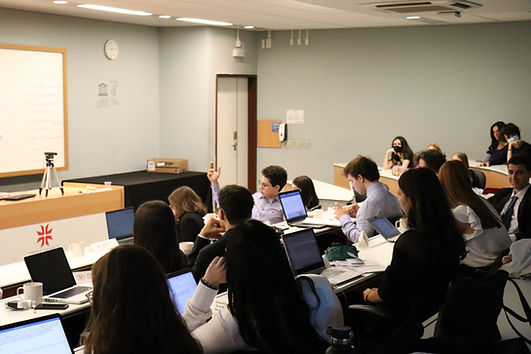
After lunch the topic technology of cybersecurity and cyber attacks came up and Russia was being cited at almost every speech, having to defend itself over and over again. Many of the delegations accused the Russian Federation of manipulating and stealing information of other countries and using it for it’s own benefit.
Russia made an excellent job defending and counterattacking the other delegations against it’s accusations.
Crisis, Crisis, Crisis! An attack in Spain occurred, where the ISIS terrorists from Syria exploded a bomb in a Spanish stadium capturing one French and one German tourist. When a crisis is given, no one can leave the room until it has been solved. Hopefully our great delegates can solve it in time, because no one intends on staying here until midnight and losing coffee break. Syria started the discussion by positioning itself saying that the delegation was completely against terrorist organizations and attacks and would do everything in it’s power to get those tourists back and capture those anarchists, to prevent attacks from other delegations. Russia, France, Spain and Germany also positioned themselves saying they would do everything they could to help not only the hostages but also the citizens. France even suggested on using the Interpol police to help identify and capture the terrorists, suggesting to keep the main focus on Germany, Spain and the French Republic. It was mentioned that it would be very helpful if the FBI helped with the investigation. Financial help was given by China and Russia. Syria then gives a very emotional speech saying that it isn’t it’s fault that those terrorists were born in Syria. The delegate became a little bit aggressive and irrational because of it, but didn’t offend or overstepped in any way. It explicitly sayd that it doesn’t support or allows in any kind of way those acts and events. Afterwards the question where those assassins would go after getting caught came up and Syria offered itself to deal with them saying that:“Violence needs to be treated with violence.” Meaning that the delegation would give a life penalty to everyone who caused the drastic event. After almost three hours, the delegations came to a conclusion and ended their work paper, finally going to the coffee break.
he last thirty minutes went by and the second day was over. Thanks to the honorable chairs, the discussions and debates ended up being very civilized and organized, and we should be very grateful to them for that. More updates will come up tomorrow.
by Letícia Amaral
ECOSOC Day 1:
The second day of Porto Seguro Model United Nation started with an anxious spirit. The fourth council session of the event begun with a motion where the delegates voted on to keep doing the first working paper. This motion kept being extended for almost an hour. The delegation of Singapore was in favour of the paper, on the other hand, Sweden made the speech against it. The delegate representing Australia agreed to Sweden and said that there are lacks in the oversight part, but Russia contested that. Causing a rival mood between Russia and Sweden. Still on the working paper number one, they were voting on the clauses, when Singapore accused Sweden of trying to "manipulate" Madagascar on their vote decisions, which made the votes be remade.
In the fifth council the delegates were still on their first working paper. One of the clauses was that there would be no financial support to countries that are in war, suggested by Belgium. Apparently, Russia felt attacked, and replied to it talking about minor countries that live in war. Sweden agreed with Belgium and contested what Russia said, by saying

that the countries in war should just "stop the war". Russia and Singapore kept saying that war is not a choice. A discussion about who started the pandemic begun, but the World Bank Group said that the actual problem is how they would solve it and not how it was not avoided.
A crisis was started in the 6th council session. The reason was that the USA was criticizing Brazil's president because he did not want to take the vaccine. As the president found out about it, he made a post on Twitter in a very unformal way. Which made the USA decide to stop importing goods from Brazil until they do something, and Singapore took side with the USA. From the beginning it was clear that Russia, China and Argentine sided with Brazil. Singapore and the USA offered Brazil to delete Bolsonaro's social medias temporarily. Australia said that his tweet should be considered a health care crime. The defence of Brazil was that the president's opinion was not the same as the whole nation. It was announced that the delegate of China tested positive to COVID-19 and had to stay in the corner and not participate until the end of the session. The crisis ended when the majority voted in favour of a revolution where the conditions were that: They must encourage Bolsonaro to take the vaccine, remove his social medias and ask for more formality of the president.
by Gabriella Aprile

UN WOMEN DAY 2
The UN WOMEN committee started the day already wishing to interact and discuss. However, the chairs initially repeated some rules and some aspects that still needed to be reminded and followed during the POSMUN days. After that, the roll call was made: All countries declared themselves present and voting, with the exception of the Federal Democratic Republican of Ethiopia and the Islamic Republican of Iran, which declared themselves only present and the French Republic, Federative Republic of Brazil, The Swiss Confederation and the Republic of Japan, which was absent.
The discussion began with a motion declared by the New Zealand delegate with the suggestion to initiate a moderated caucus, which passed. Venezuela started the discussion, returning to the last subject of the previous day, namely, the boxes for the donation of menstrual supplements. Before reaching any discussion, the delegate of the Federative Republic of Brazil arrived and declared herself present and voting. It was then decided, after much discussion and argument on the part of the countries, that the donated products can either be distributed in places such as schools, health stations, among others, in countries with the financial conditions to pay for these distribution systems or use the "take and leave" system in countries with less financial structure, where people donate and take products, if necessary.
With that, working paper 2 was finalized and passed to the chairs to correct and the countries continued with the next topic on the agenda, which was the distribution of medicaments.
All countries agreed that medicaments could only be distributed with a medical manuscript, as these are very strong and can harm health if not used correctly. With that, the delegate from Venezuela declared a motion suggesting an unmoderated caucus to discuss the issue of medicines that should be distributed. This motion passed. The delegate from Turkey continued with the discussion, recalling that the distribution of medicines has to respect the health system of all countries, which the other countries in the discussion also agreed with. As a final solution, after the countries debated and presented various arguments, it was established that each country is responsible for which medicines will be distributed in its territory. In addition, it was established that in order to obtain medicines from health centers, it is necessary for beneficiaries to receive an explanation about the proper use of drugs.
After the solutions were established and all countries were in agreement, the working paper 3 started to be worked on. China then proposed an unmoderated caucus to discuss the next topic of the agenda. This motion passed. Venezuela then proposed to discuss how homeless, refugees and prisoners would be situated in the distribution of menstrual products. The discussion then began to revolve around the LGBTQ+ community and whether or not they should receive the donation of menstrual products. Iran and Ethiopia declared that they do not support the LGBTQ+ community and therefore wouldn't help transgender people with any kind of donation. The other countries declared themselves in favor of helping all individuals who menstruate equally, because they defend that everyone who needs menstruation products need to have access to these products, since according to the human rights the rights to personal hygiene have to be equal for all people, without specification. The United States of America then suggested changing the expression "women who menstruate" to "individuals who menstruate" in the document. However, Ethiopia and Iran didn’t agree with the other countries, because they do not recognize the LGBTQ+ community, and therefore they are against changing "woman" to "individuals" in the document. Even after much discussion and pointing out of arguments, the countries couldn't reach an agreement and so the committee decided to do a "tour the table" system, where the countries were called according to the list to declare themselves for or against the idea proposed by the United States, with the right to a 30 second speech supporting their position. All countries declared themselves in favor, except for Iran and Ethiopia, which declared themselves against the idea. By more votes in favor, the idea of replacing "women who menstruate" with "individuals who menstruate" was carried into the document.
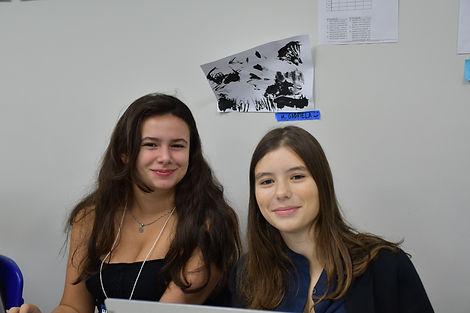
After finishing the discussion about transgenders being part of menstrual product donations, the next topic to be discussed was prisoners in relation to menstrual product donations. With this, a motion was suggested by the United States, to continue the discussion with the speaker list. This motion was accepted. Iran started the discussion by claiming to be against women prisoners having the same right to receive donations as women who have not committed crimes. Turkey disagreed with Iran, claiming that women prisoners who have committed crimes still have the right to basic hygiene as any other individual who needs menstrual products. The other countries agreed with Turkey, claiming that Iran was going against what the countries were fighting for, i.e. the government providing menstrual products without personal reasons. Iran denied it was a personal reason, claiming that the criminals offended their country, and given the choice between providing menstrual products to innocent people or criminals, they would choose innocent people in need. After many disagreements, the discussion was postponed until after the coffee break.
After the coffee break the roll call took place again, where all countries declared themselves present and voting, with the exception of the Federal Democratic Republican of Ethiopia, which declared themselves only present and the French Republic, The Swiss Confederation and the Republic of Japan, which was absent.
Soon after, the previous discussion about the rights of the women prisoners was resumed, where the delegate from Mexico claimed that it is not the right of the government of Iran to claim who is entitled or not to receive donations, which was disagreed by the delegate from Iran, who defended that her country is responsible for deciding to whom its distributions go. In the end, even with the disagreements on Iran's part, a solution was established, which was to warn about the importance of hygiene for menstrual health and advise the distribution of soap and sanitary products to the prisoners.
The UN WOMEN committee then decided to move on to the next item on the agenda, this being the access that refugees and homeless people have to menstrual products. Venezuela initially proposed campaigns for both as a solution to this problem. Other solutions, such as the distribution of menstrual hygiene products in the refugee camps and for NGOs or countries not suffering from financial crisis to help in the donation appeared during the discussion. In the end it was agreed that a "period fund" be added to the UNHCR budget to address the problem of menstrual poverty in refugee camps should be the final solution. Regarding the homeless, it was determined that actions should be encouraged.
The subject "lack of access to toilets" was also part of the debate, being introduced during the speakers list by the delegate from the United States. She stated that an action should be taken to make public toilets more useful and spread them throughout the countries, so that women could have access to clean water and public toilets without any problems. This topic didn't generate much disagreement between the countries, which established the solution by creating the "Proper Toilets" project that works for the construction and restoration of public toilets in poorer areas and the guarantee of running water for these toilets.
crisis they were facing. New Zealand then suggested the idea of making rates on top of products equal between both genders, claiming that this would not solve the problem, but would significantly decrease the taxation.
Before any solution could be made, the discussion was postponed until after lunch through a motion suggested by the Ethiopian delegate.
After the lunch a roll call was made once again, where the same countries declared themselves present and voting and the same countries were not present. New Zealand then suggested a motion to reopen the speaker list, which was accepted. The subject of taxation returned to the spotlight, still in relation to the rates being equal rates for both genders, since they cannot be seen as luxury products, but as basic products. The delegate from China then proposed that financially well-developed countries should reduce their import and export taxes instead of lowering sales taxes in the countries themselves. This idea generated a lot of discussion, full of disagreements and even drawings on the board to explain better an idea. In the end, however, the committee came up with solutions, which were:
1. Suggests that menstrual products are equally taxed as other basic needs products not as a luxury;
2. Suggests that governments from each country promote tax incentives to attract factories/companies that produce menstrual products to produce them on their lands;
and
3. Encourages the reduction of import and export taxes from the countries that are producers of menstrual products for the ones who are buyers of such products.
Working paper 4 was then read and approved by all countries.
A motion was then suggested by New Zealand to reopen the speakers list. This motion was accepted. New Zealand then proposed that as the next topic on the agenda, the discussion about the impact of menstruation poverty in relation to psychological and physical diseases should take place. The discussion began and the delegate from Venezuela then proposed sharing experiences to improve mental health as an idea of a solution, but New Zealand was against it because it believes that sharing on certain occasions can harm mental health more. Venezuela then explained in response to New Zealand that hiring specialists to deal with the experiences of individuals is not always possible, as it is expensive and many countries cannot afford these costs. She then claimed that there are people who feel comfortable sharing experiences and for that reason this idea would be valid to establish a solution to the problem discussed. Other problems, such as access to the internet, were also the subject of this discussion, but in the end the countries reached a consensus and established as a solution that the creation of a mental health structure focused on menstruating beings who have had great trauma in relation to the situation should be encouraged. Other solutions established were the creation of support groups in community centers where women who have experienced menstrual poverty can share their experiences; the creation of online platforms where menstruating people can share their experiences of menstrual poverty and seek appropriate volunteer help from psychologists, where they also encourage governments in developed countries to help financially unstable countries create a health framework; encourage NGOs to support the undeveloped countries by providing a team of psychologists and encourage the creation of a sport project as a way to decrease anxiety levels. The discussion was then interrupted by the coffee break.
After the coffee break New Zealand raised a motion to reopen the speaker list, but before any delegate could start the discussion a crisis was announced.
An audio has been leaked of a private president Jair Bolsonaro and the Mexican president Andrés Obrador, where they talk about diverting public funds earmarked for menstrual poverty for private use. There was a third voice, but this one had not yet been identified.
A motion was suggested by the US delegate to hold an unmoderated caucus until the rest of the session, in order to discuss this crisis. The motion was accepted. A long discussion between the countries began, with the aim of resolving the crisis.
The UN WOMEN newspaper in charge, that is, me, decided in the meantime to see what the impressions of some delegates were in relation to the unexpected crisis at the committee. The delegate from Turkey said that as a first step, she wanted to demand a position from each country involved and then help to solve the problem. The delegate from Ethiopia, on the other hand, said that she was not surprised at all by the speech of the presidents of the countries involved, as Mexico is an underdeveloped and poor country, so these issues of menstrual poverty are not very important and relevant to the leaders at the moment and Brazil has even banned the law to hand out sanitary pads for free, so she was not surprised by the crisis. Before continuing with the interviews, however, the third voice was recognized as that of the president of Iran. After this information was released, I continued the interviews now with the delegate from Venezuela, who saw the neglect of the presidents with this problem as absurd, since the population will thus give less importance to a serious problem. The delegate from New Zealand, on the other hand, had a slightly different impression than other countries, as she initially believed that the presidents' pronouncement could be ironic and not something really serious, which turned out to be quite funny.
by Mariane Heineken
UNODC DAY 2
One day in, one day left of POSMUN
The second day got right to the point, as soon as the council session began, the delegates discussed and made some alterations to the agenda. Today things picked up very quickly. The delegates attacked each other, which made for a much more interesting and informational debate. They discussed how cryptocurrency impacts human trafficking. Many aspects of this topic were mentioned, such as banning cryptocurrency or tracking bitcoins. Two other factors were then introduced: fake news and social media. Several delegates talked about how fake news helped the human trafficking process. The debate about social media revolved around age control and several points were made, such as what the minimum age for having social media platforms should be. Soon the question of satellites and drones emerged. A couple of delegates suggested using satellite technology to track victims or traffickers.
After the first coffee break of the day the delegates started on their working paper. They worked collectively and discussed freely with each other. While writing the paper, there were several moments in which heated debates started. The delegates then read out their essay, which was followed by a moderated caucus.
Following lunch, the debate started with a dialogue, when suddenly a crisis was announced, causing an uproar and throwing the council into chaos. The problem to be solved was that German planes had seen Syrian refugees being trafficked by Iranian ships into Russian cities. At first the delegates were in complete shock, but soon after they immediately stood up and came together to talk over the task to be completed. The delegates organized themselves into alliances, with their relationships with other countries in mind.
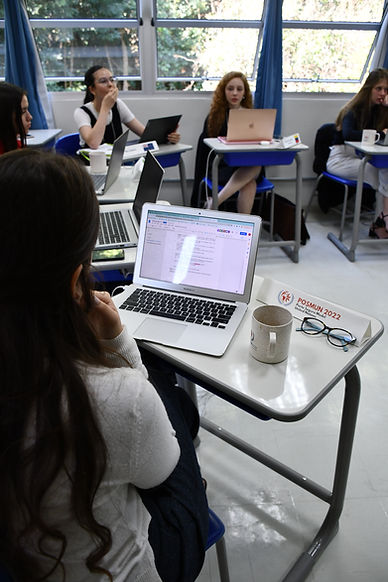
A motion was suggested by the US delegate to present working paper 3 and take a vote to see if all countries agree with the document. This motion was approved and all countries voted in favor of the document, which was then passed to the chairs to correct. The United States then suggested another motion to reopen the speakers list and decide what the next topic to be discussed would be. Before officially establishing the next topic, a vote was opened to materialize the idea of not specifically discussing the impacts of the COVID-19 pandemic on the global menstrual poverty panorama, since the covid impacts was already indirectly discussed in other working papers. The vote was unanimous and declared as previously discussed.
The problem of taxation on menstrual products was therefore the topic of the agenda chosen to continue the discussion. New Zealand started the discussion by explaining that this taxation on women's products has a name, that is, the pink taxation. She refers to the tendency for products marketed specifically toward women to be more expensive than those marketed for men. The solution to eliminate fees on female menstrual products had a huge impact during the debate, but delegates from Mexico, Iran and Venezuela claimed that it was not possible to lower any fees in their countries due to the financial
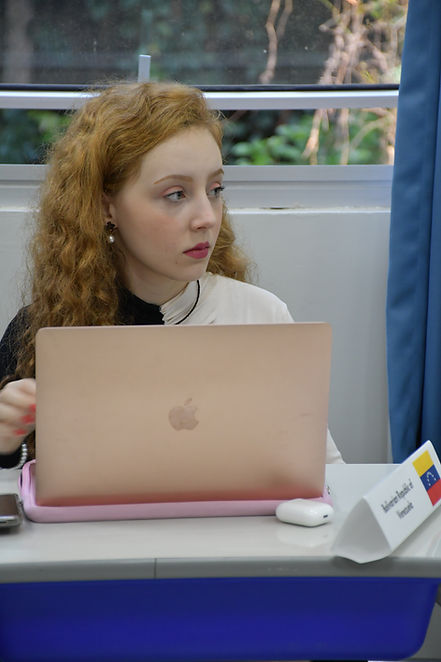
After understanding the impression of some countries in relation to the crisis, the countries involved in it began to defend themselves and explain their reasons. Mexico claimed that as the audio is not an official speech, it could have been interpreted in different ways, many of which were incorrect. In addition, the country claimed that the president of Mexico himself has already made an official speech in favor of the protection of women, where he said that he is aware of the problem and supports projects related to menstrual poverty. And finally, the country even defended that the Mexican government itself has already passed several laws that reduce menstrual poverty. In this way, the delegate from Mexico states that in fact the money is not being diverted for the president's own use, but to be used for bigger problems that the country faces, such as the economic crisis, but that the money will later be used to the poverty of menstruation. Brazil, on the other hand, claimed that the audio must be some misinterpretation of facts, as the Brazilian government itself has already passed a law to distribute pads for free to homeless people, students, prisoners, etc. Iran also declared that the audio is not an official speech, and for this reason it could have been interpreted in different ways, many of which are incorrect.
The country then recalled previous discussions, where Iran had been against changing "women who menstruate" to "individuals who menstruate" and explained that in the audio the president says he is against the distribution of products to individuals and not to women who menstruate, which sustains the country's position. In addition, distribution is also not seen as a priority and for that reason it should be put aside to solve the country's internal crises first. In the end, as solutions, mainly helped to be found by countries outside the crisis, such as the United States, Turkey and New Zealand were found, such as:
1. Call on the initiation of a formal investigation held by the UN WOMEN committee regarding the embezzlement of funds that should go towards mitigation of menstrual poverty;
2. States that all UN funds for mitigating Period poverty directed towards the Federative Republic of Brazil, the United Mexican States and the Republic of Iran should be supervised by the UN WOMEN committee.
3. Encourage the NGOs already approved by the countries to continue helping in the distribution of period products;
and
4. Encourages the population to get informed about what has occurred to prevent the spread of fake news;
With that, the work paper of the crisis was presented and approved by all the countries. A motion then suggested by the United States closed the 2nd day session of the Posmun.
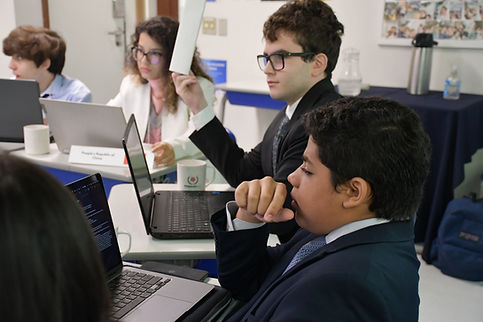
After an unmoderated caucus the council originally came to the conclusion that Iran and Russia would apologize and accept the blame for trafficking Syrians. Furthermore they would use funds coming from developed countries such as Germany and the US to create projects to help fight against human trafficking. However the delegates later made it clear that Iran would receive the majority of the blame, which the delegate of Iran accepted with the condition that the countries help the Iranians.
Even though Russia was not necessarily the trafficked Syrians’s final destination, it was established that they would still receive partial blame for not controlling the docks or supervising their borders. For the rest of the session, the council put their solution into writing, a more productive way to consolidate their plan and add more details.
Today the council sessions were more formal and it was evident that the delegates are getting used to the language and behavior expected in a debate. However, there was also more drama, seeming that the Syrian delegation did not agree to the plan established by all the other delegations and instead, wrote it’s own resolution paper, which caused quite a commotion. It was very interesting to watch the delegates come out of their shells and gain confidence to really interact with each other, wether it was asking a mere question or attacking another country.
by Allegra Ho
Day 2 at Human Rights
After a repetitive and slow day of discussions, the delegates present at the Human Rights Committee of POSMUN started off the second day of debates by doing the usual roll call. The delegate of Germany returned to the debate, but the delegate of the United Kingdom didn’t show up to today’s debates. During the night, the Chairs sent the delegates a schedule to be followed, so that the debate can flow better, and in the end a good draft resolution is accepted. The chairs advised the present delegates to move faster in the production of the working paper. The Committee then entered a unmoderated caucus to debate about the topics in the working paper. Throughout the debate, topics such as the use of laws to criminalize state-imposed forced labor and the improvement of education in developing countries were discussed. After a long time of discussion, the committee was able to elaborate two working papers on the same topic. The first one, presented by the delegation of Eritrea, states that reinforcing existing laws will not help on ending forced labor.
Regarding education, less educated countries should receive economic help from economically advanced countries. The delegations who discussed the working paper also agreed on making schools part-time, so that the kids who need to work have time to do so. Regarding minorities and modern slavery, these should be integrated in the society and states who represent the majority should stop using their power in poor countries to make them work. The second working paper was presented by the delegation of Australia and focuses itself on ending modern slavery by cutting its root, who for them is poverty. In the working paper, the delegations recapture ideas discussed in yesterday’s debates, such as the New Deal. Topics previously defended by these delegations, like the criminalization of state-imposed forced labor, debt bondage and the regulation of child labor were also included in the working paper. Although some delegations present themselves as against state-imposed forced labor, their newspapers state that they are not. One of them is the delegation of the United States of America, who assiduously defended the criminalization of this, but, as stated by the delegation of Nepal, they still force Mexican immigrants to work for a very small wage. Through a semi-moderated caucus, the delegates could discuss the topics of the working paper presented by Australia in which not all delegations agree.
After 20 minutes of debate, the delegations proceeded with a clause-by-clause voting on the working paper, and, fortunately, they could unify the clauses in time of the end of the debate. Most accepted clauses came from the working paper presented by the delegate of Australia. The delegations were then able to move on with the agenda, proceeding to the second topic: “Human Trafficking”. A unmoderated debate was then used to start the discussion of the topic until the end of the session. It is noticeable that the delegations changed their way of acting, providing a remarkable acceleration of the committee’s motion. Hopefully, this rhythm will continue for the rest of the POSMUN conference.
A unmoderated caucus was used to open the discussions on the second topic of the agenda. Throughout the caucus, the delegates started working on the committee’s second working paper and opened a speakers list to proceed the discussion of the document. The delegation of Russia reinforced the necessity of not repeating topics every time, so that the council can keep its rhythm. As forms of solving the problem involving human trafficking, the delegate suggests the identification of victims through their fingerprints. This would be done in the countries’ borders, who, according to the committee, should be reinforced. The importance of registration and informing people about its benefits was thoroughly reiterated by the delegates of Eritrea and United States through the discussion. Registration not only grants people their rights, but also confirms their citizenship at the country they were born in. The delegations could elaborate one working paper together, so it was automatically accepted by them. After a unmoderated caucus to discuss the third topic of the agenda, the Chairs recognized that it had been discussed, and suggested its modification. The beginning of session 6 was then dedicated to the discussion of changes and inclusions to the topic.
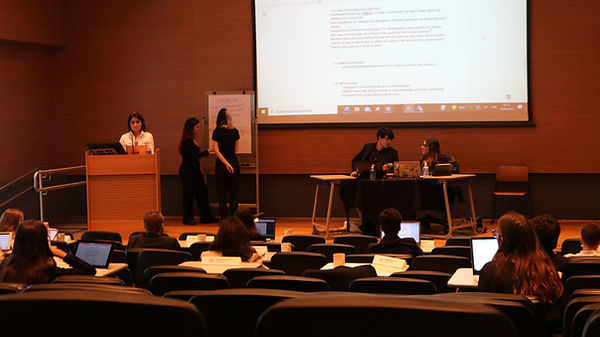
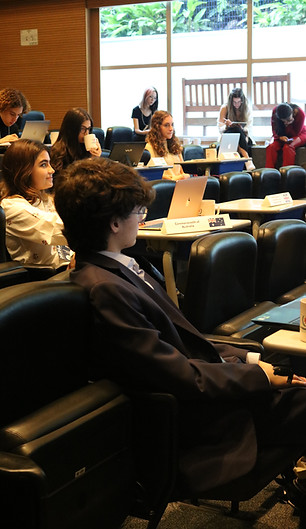
A topic that concerns the chairs is the decorum in the committee. Both yesterday and today, Camila and Lucas had to remind the delegations to be respectful to them and between each other. After a unmoderated caucus, the delegates could come up with and vote two new topics for the agenda, after being suggested by the chairs to do so. The committee then went on to discuss the third topic of the agenda: “Leading factors of forced labor”. Delegates focused their discussions on the retention of identity documents and withholding and regulation of wages as reasons for forced labor, generating discussions of how to change both aspects. Concerning identification information, the delegations discussed a lot on how to ease the access to personal information. The chairs suggested the delegations took this discussion into the scope of work, meaning that the committee shall now discuss the retention of identity documents by employers. Athwart a unmoderated caucus, the delegates were able to start working on the committee’s third working paper. This document was then voted clause-by-clause, and all of them passed, allowing the committee to proceed with the discussion of the fourth topic of the agenda: “Acceptance of immigrants”. The discussion
encompassed the economic challenges faced by immigrants, xenophobia/rejection and social inclusion challenges faced by them, and methods of preventing immigrants from ending up in forced labor conditions. Financial aid to the immigrants was exceedingly defended by the delegations, mainly coming from governments or specific organizations. UNESO, an organization created by the committee, and the countries’ government would be the source of help for financially weak countries. The delegates then received the news that the coffee break was anticipated, so the session had to automatically be adjourned by the chairs.
Finally, today’s last session initiated with a debate in form of speakers list. The delegations were then interrupted by the Press, who announced a crisis. Two Australian and three Filipino immigrants were found by American journalists in government forced labor camps in Xinyang, China. The delegates rushed to an unmoderated caucus, urging to resolve this crisis as soon as possible. The method of unmoderated caucus has been very useful for the delegates on the elaboration of working papers and discussion of topics. During the crisis, it was also used to elaborate all necessary documents to clarify the problem. The delegates, after a fervorous discussion, could deliver two working papers for the crisis. The first paper was presented by the delegate of China, who apologized to the involved countries and stated that the accusations were invented by western media. As a response of the situation a formal apology to the delegations of Australia and the Fillipines will be delivered, together with the opportunity of further investigations coming from both countries. Financial and health aid were promised by the Chinese delegation to the 5 victims. The delegate of the Fillipines then went on to present the working paper developed by the other Bloc. In the document, the delegations agree with the formal apology and the investigation and encouraged the Chinese government to criminalize state-imposed forced labor and the people who enslaved the 5 victims. Both working papers were voted as a whole, and only the first working paper was accepted as resolution for the crisis, declaring it officially solved.
by João Gabriel Frick
Human trafficking in the 20th Century:
Human trafficking is not a recent concern. Researchers say that no country is protected from it. Solving this problem is one of the tasks of the delegations at the Human Rights committee
During the second day of discussions at the Human Rights Committee in POSMUN, the topic of human trafficking and forced labor was thoroughly discussed. Although this topic is very recent, this crime is not. Mostly with the intents of forced labor and sexual trafficking, people are every day hijacked from their homes and sent to unknown countries.
According to the American financial magazine Forbes, human trafficking is the “pandemic of the 21st century”. In their article, they exemplify the case of Yazidi women, who in 2014 3200 of them were abducted from Sinjar in 2014. Most of them were subjected to forced conversion, marriage, rape, and sexual abuse. No country is safe from human trafficking since this crime is also committed by governments. The same magazine also states that human trafficking is a business that generates a profit of approximately $32 billion annually. UNICEF estimates that there are around 21 million trafficked people around the world. In this number are included 5.5 million children. Knowing that governments are involved in this, and that they profit from such terrible crime turns this felony even worse, and challenges the delegations present at the Human Rights committee even more on finding possible liars and solving the problem correctly.
Throughout the committee sessions, the delegates are still on the search for a form of stopping this. One of the most defended forms was the reinforcement of countries’ borders, for a better mapping of the victims and ending such horrendous violation.
